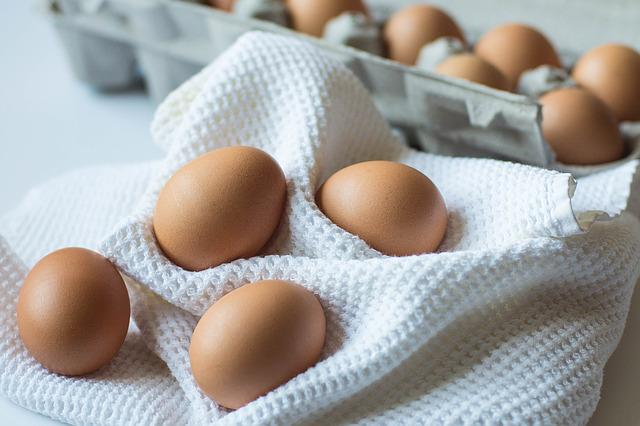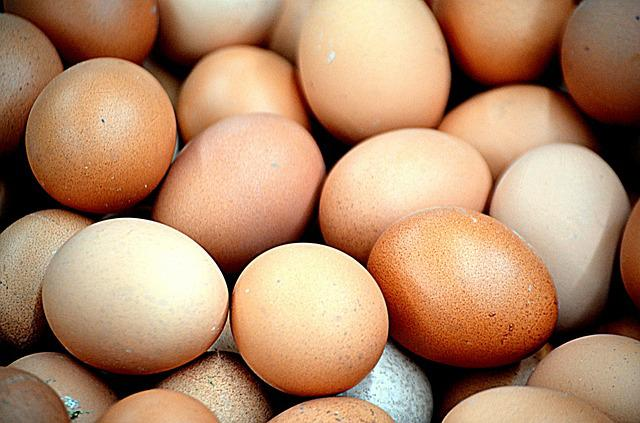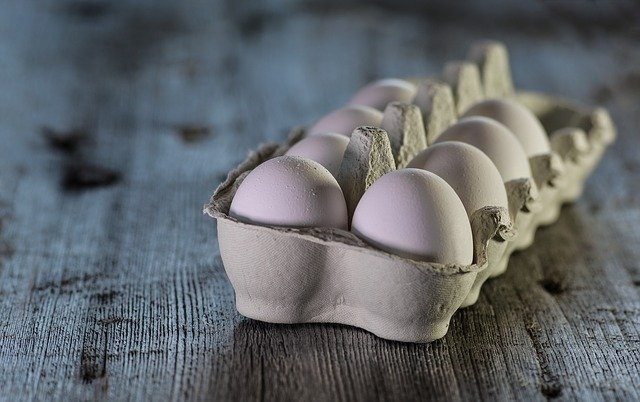Clean fresh eggs do not get processed like commercial eggs are. This allows you to handle fresh eggs differently from store-bought. What is the most efficient method of storing a fresh egg? Can chicken eggs be cleaned?
Farm-fresh chicken eggs are quite unlike those purchased in supermarkets in many respects. It might be the first time you will notice their golden yolks and their unique color combinations. Most fresh eggs are usually of superior taste, texture, and thicker eggshell because of the higher levels of care and nutrition than large poultry operations.

Cleaning Freshly Laid Eggs
There are two schools of thought when it comes to cleaning eggs: some people believe you should clean them before eating them, while others think that’s not necessary. You’re not eating the shell after all, right? However, you are transferring any bacteria from the shell to the raw egg once you crack it. As long as you’re aware of the proper handling and understand the potential downsides (aka risks), the choice is yours.
That said, if you’re giving your eggs away, then it’s important to clean them up first so the recipients don’t end up with a yucky surprise. The best way to go about this is by checking for dirty eggs every day and getting rid of any that are cracked.
If it the eggs get a bit dusty or sometimes muddy while it’s in their nesting box, use a dry cleaning pad or paper towel to wipe off the dirt. You can also scrub the egg with a cleaning pad if needed–just make sure you rinse it off afterward. If all else fails and the egg is just too dirty, then use warm water with a small bit of sudsy soap!
Let the person receiving the eggs know if they were washed and that the fresh eggs will need to be refrigerated.
What Is The Egg Bloom?
The egg’s bloom is a thin film on the outside of an egg that prevents bacteria from entering. The bloom protects developing chicks from bacteria as they incubate under momma hen or your favorite incubator. The egg bloom is typically more prevalent on fresh eggs.
The protective coating that the hen puts on the outside of a fresh egg acts as the first line of defense against harmful bacteria and contamination. When you crack open an egg, you might be able to see and feel the bloom covering its surface. It can often be described as a waxy or wet coating.
However, because it’s a thin layer, the bloom can easily be damaged–which makes eggs susceptible to contamination and spoilage. This is why it’s important to always wash your eggs before consuming them! Although you do not need to wash dirty eggs unless they are visibly stained or have hardened yolk residue on them, you can clean them by gently rubbing them with a sanding sponge.

How to Clean Fresh Eggs
Cleaning or washing fresh eggs has been a debated topic. Some people feel it’s necessary and others don’t. Washing eggs isn’t necessary until you are ready to prepare them to eat.
If you are giving away freshly laid eggs or eating them yourself, it is best to clean them! The easiest way to clean eggs is to make sure they are laid in fresh straw. You can remove any large pieces of muck from the nesting box each day.
When To Wash Fresh Backyard Chicken Eggs
It is a good idea to wash eggs when they are soiled eggs. Sometimes eggs come up with poop, mud, or otherwise need a good rinse. Promptly refrigerate once washed to extend shelf life.
Otherwise, egg washing isn’t necessary and an unwashed egg can be stored at room temperature. Store unwashed eggs away from direct sunlight and not in a very hot room temperature.

Cleaning Dirty Eggs
Start by wiping the egg’s shell with a mildly abrasive dry pad. Once dirt and debris are rubbed off, wash gently with warm water and a little soap (do not soak eggs). Finally, rinse, pat dry, and store in a container in the refrigerator.
Just as important is rinsing out with hot soapy water the scrubber you used and letting dry thoroughly. Keep this separate from other kitchen cleaning sponges, pads, etc.

How To Store Fresh Backyard Eggs Properly
There are many ways to store fresh eggs, but some methods are more popular than others.
Countertop
Fresh unwashed eggs can safely be stored on the counter at room temperature for up to 3 weeks. You’ll need to them keep in a darker spot. Keep out of direct sunlight and not too warm. Take into consideration if your home gets hot during the summer. A heat wave could compromise the quality.
Refrigerator
This will allow you to keep your (washed eggs) for a month. Washed eggs should be put in a crate or container. Now that they’re washed, the shell is more porous and can begin absorbing other refrigerated odors and bacteria. You can still use washed eggs past the one-month time, however, they significantly lose their nutrients, freshness, and flavor.
Cold Storage
Storing your fresh eggs at a temperature of around 50 degrees Fahrenheit. This location should be dry and free from excessive humidity. If you are able to maintain temperatures and humidity levels, this can work for about 3 months.
Freeze
If you’re like a lot of backyard chicken homes, come summer you end up with an abundance of fresh eggs. Along comes winter and you’re crying your way to the local market to buy not-so-tasty store-bought eggs. This year, start freezing some of your backyard eggs for winter use.
Crack, mix and freeze. The key is to mix the whites and yolk well but not ‘beat’ them. Freeze in silicone icecube trays or even in a muffin pan. Freeze 4 – 6 hours then pop out and store in freezer bags. Best used within 3 months, however, you can use it safely for up to one year. Defrost in refrigerator before using.
Tray sizes vary. First, try mixing the yolk and white of one egg and see if it can fit into one icecube tray slot. Do the same with cupcake pans. You should be able to store 2 – 3 eggs in each section of the cupcake pan. This will help you determine how many frozen pieces you need for recipes or for omelets or yummy scrambled eggs.

How to spot a rotten egg
It’s important to be able to spot rotten eggs, as they can make you sick. All eggs should be cracked into a bowl before being used in any recipe, in case there is any rot inside.
The two best ways to test for a fresh egg are the floatation test and the sniff test. The floatation method is when you put a raw egg in a glass of water and see if it floats.. An old egg will float because the air pocket inside gets bigger as time goes on.
The Float Test
The float test is a simple way to see if an egg is fresh or not. To perform the test, place the egg in a bowl of cold water and see if it floats. If it does, that means there is more air inside the egg and it is no longer fresh.
The freshest eggs will lay on the bottom of a glass or bowl, while older eggs will lay up slightly. The higher an egg floats, the older it is.
Older eggs are still safe to use. We’re not talking about the floating eggs, but the one’s in between. They’re actually preferred for hard-boiled and soft-boiled eggs. They peel more easily than fresh ones too! They’re also great for pickled eggs.
A general guideline to check the freshness of an egg is to see if it floats. If it does, that means the egg has gone bad and toss it.

The Sniff (Smell) Test
The second way is to smell it. If you can smell the rotting odor, toss it right away. Of course, you may need to crack the egg shells open to be sure. But trust us when we say if it smells on the outside, it’s going to smell a whole lot worse inside!
These methods are the same whether it’s store-bought eggs or freshly laid eggs.
Why do unwashed farm-fresh eggs last longer than washed eggs?
The unwashed eggs have a natural coating that helps keep the freshly laid eggs from drying out. This prevents bacteria from entering through the shell. The shell is covered with a thin waxy layer that protects the yolk and whites. This bloom is actually a protective barrier that can be washed off when you wash the fresh eggs.
Once you wash eggs, refrigerate them immediately. Once the bloom is washed off bacteria grow, so it’s important to store them in a cold environment.
The USDA requires all commercial eggs to be washed and then refrigerated because this helps increase their shelf life.
Do you need to wash fresh eggs before cracking?
The answer to this question is common sense. As a general rule, yes, wash store-bought eggs before they’re cracked open. The USDA requires they be cleaned, However, you never know how many hands have handled them before you eat them.
Freshly laid eggs that come from backyard chickens need to be washed for the same reason you should wash your hands after using the restroom, to clean off any germs/bacteria from the animal feces.
However, if there is straw, chicken feces, or other material on the eggshells, it’s important to wash them off prior to cracking because these substances can contain bacteria which may cause food poisoning. It’s also important to remember that just because an egg hasn’t been washed doesn’t mean it isn’t clean–many people choose not to wash their eggs because it reduces the lifespan of the egg by causing it to lose its natural coating.

Can you eat unwashed fresh laid eggs?
If you have backyard chickens and they’re laying, there’s no need to wash them before storing them. The protective layer on eggs is called a “cuticle” and if it’s disturbed, the egg then becomes more susceptible to bacteria.
However, if you’re in a hurry or your girls lay outside of their nesting boxes and there’s some dirt, wiping them gently with a dry cloth is an option. Eggs should be stored in the fridge in an airtight container.
Other Commonly asked Questions
How often do chickens lay eggs?
One egg per day is the average for chickens, but they will lay less during periods of cloudy days, daylight savings time, broody periods. Read more here.
For a more in-depth understanding of how long chickens lay eggs in their lifetime and life expectancy, read here. Learn more about helping chickens lay eggs in the winter here.
Read more here about why chickens stop laying eggs.

What color eggs will my chickens lay?
The egg’s color is dependent on the breed and age of the hen. For example, a White Leghorn chicken will lay white eggs, while a brown leghorn chicken will lay brown eggs.
The color of the shell has absolutely no difference in the quality taste or appearance of the yolk and egg white. They’re all the same on the inside.
What should I do with frozen eggs that crack?
Discard these. There’s no way of knowing if and how much contamination the yolk and white have been exposed to.
Related Reading: Picking a Cold Hardy Chicken Breed for Your Backyard Flock.
Why are my chickens eating their eggs?
One of the questions we are often asked by chicken owners is “why are my chickens eating their eggs”? There could be a number of reasons for this. One of the most common is that the chickens are bored. If they’re not given enough things to do or enough space, they will start picking at their eggs out of boredom.

Calcium
Another reason your chickens might be eating their eggs is that they’re looking for calcium. Chickens need calcium to lay healthy eggs. If they’re not getting enough from their diet, they may start looking for it elsewhere.
Chickens can also start eating their eggs if they’re stressed or anxious. This usually happens when there’s a lot of noise or commotion going on in or near the yard. The chickens feel like they need to hide their eggs somewhere safe. This could be a sign of predators or merely neighborhood construction.
You can give them a little extra calcium in their diet. This helps to make sure they’re getting all the nutrients they need. Oyster shells are a great supplement to provide egg layers. You can also try giving them something to do with their nervous energy.
Boredom
If they’re not free-range then you can add scratch to their run area. Place a few well-placed sturdy branches for them to perch on and explore new spaces. Chicken swings are fun too. These toys may also help keep your free-range flock out of your garden.
Related Reading: Pros and Cons of Raising Your Own Backyard Flock
Parting thoughts
Whether you’re getting a dozen fresh eggs or only a few, we’re sure you don’t want them to go to waste with improper egg storage and washing. Keeping the nest boxes cleaned, regularly collecting eggs, and discarding broken eggs are all a day in the life of backyard flock care.
Most likely, you’re raising chickens for your family to have fresher foods and a better appreciation of farm-to-table nutrition. If you have children, you can use all this information as teachable moments.
Understanding the reason for keeping the bloom intact (natural protective coating) and proper ways for washing eggs to storing options are all part of the process. None of it is hard, just a learning curve. Follow these tips and information and you’ll be good to go.
Related Reading: Raising Backyard Chickens; Tips for Beginners




Pingback: Raising Ducks For Eggs: An Easy Beginner's Guide - Gilmore's
Pingback: How Many Eggs Do Chickens Lay? This May Surprise You! - Gilmore's
Pingback: 18 Cold Hardy Chicken Breeds For Harsh Winters - Gilmore's
Pingback: Chicken Care In Winter Months; Warmth & Health Of Flock - Gilmore's
Pingback: The Best Birdseed to Attract Backyard Birds - Gilmore's